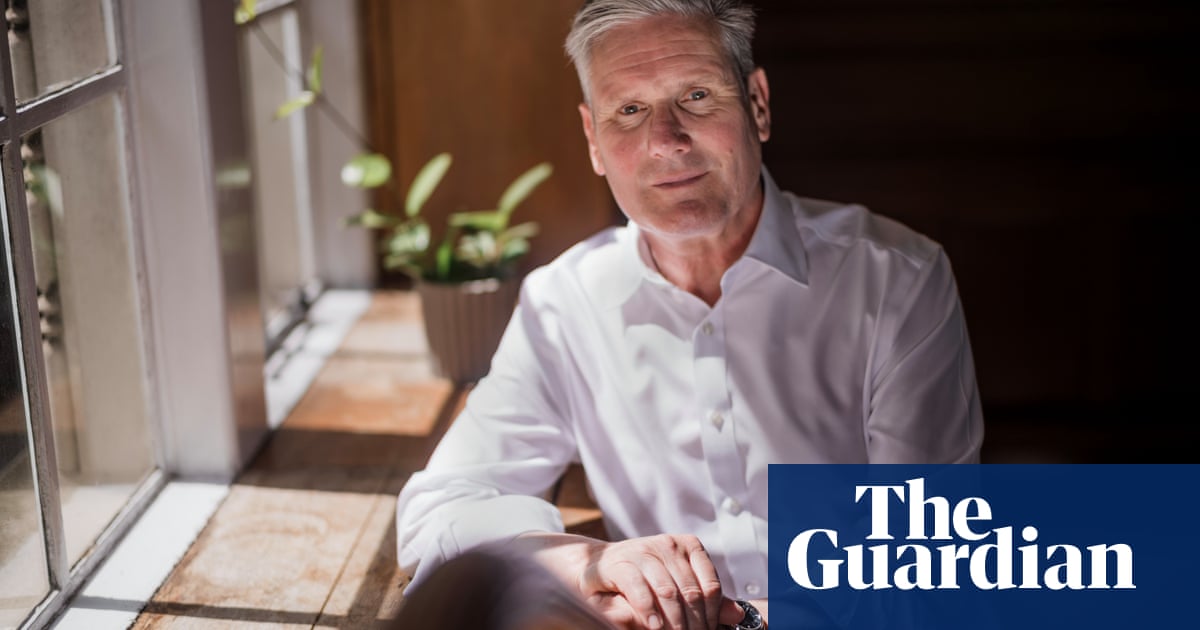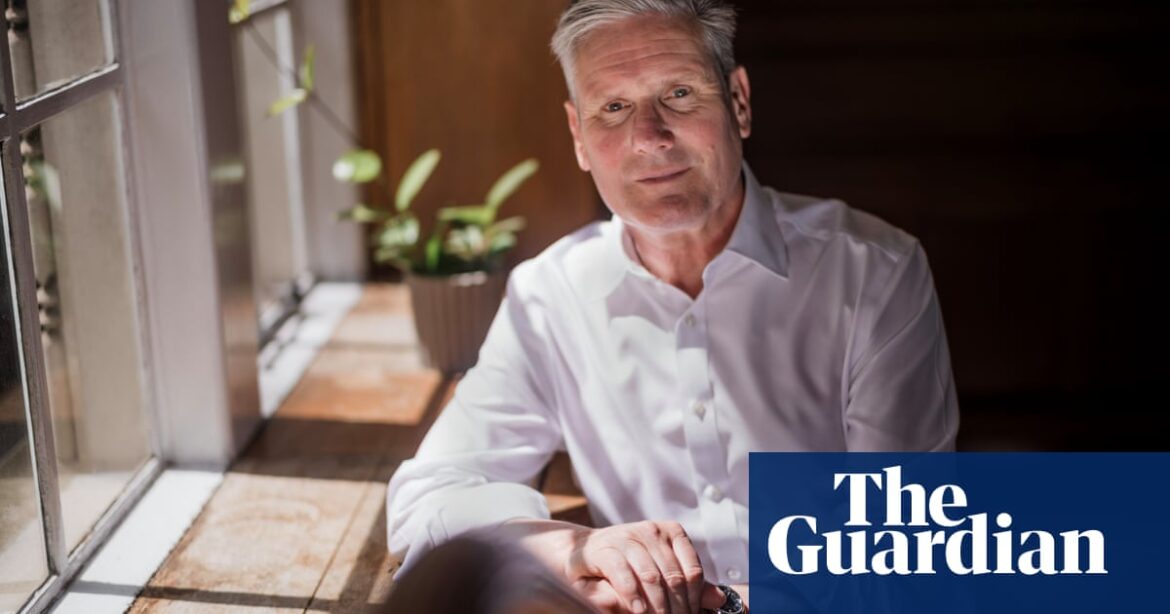
In just five days’ time, Keir Starmer could be walking through the famous black door of No 10 as the country’s new prime minister. But even though the polls suggest that is the likely outcome, he’s not taking anything for granted.
“We’re as ever trying not to get ahead of ourselves,” he gently insists when asked if he has ever been inside the grace-and-favour flat above Downing Street (he hasn’t, for the record).
“People talk about the inevitable outcome. It isn’t inevitable. I think there’s a yearning for change. But you know, what we always say, if you want change, you have to vote for it.”
Starmer is sitting, shirt sleeves rolled up and steaming mug of black coffee in front of him, in a meeting room at the Royal Horticultural Halls in central London before a rally marking the final weekend of the campaign.
We have been promised celebrity endorsements. He remains tight-lipped, but laughs when asked if it might be Taylor Swift, after he was pictured at her Eras Tour show at Wembley last week. It turns out to be Elton John.
The polished wooden table is laden with plates of cakes and piles of teacups and saucers, which rattle slightly when he bangs his fist for emphasis. In front of him is a lined notepad, which he scribbles on when he wants to illustrate a detailed point.
Starmer is a details man. Whether it is the former lawyer in him or the senior civil servant, he is fastidious about setting out the case for what he wants to do in government. He only entered politics a decade ago, and is suspicious of some of the conventions he encountered at Westminster.
“For four-and-a-half years people have been saying to me go faster, go slower, look over there, deal with this. The only reason we’re in the position we’re in is because I knew where I needed to be, and that is my lodestar.”
When Starmer took over as Labour leader in early 2020, the party had just suffered a historic election defeat to Boris Johnson’s Conservatives. In the early days of his leadership he set out his plan to transform his party internally, take the fight to the Tories and then to win an election.
At the time, and on many occasions since, it has looked impossible. But the Labour party is, once again, sitting on the brink of power. Yet Starmer is aware that there is widespread disillusionment in British politics that he will have to overcome.
“The hope has been kicked out of many people. They’ve been promised lots of things that haven’t happened and that leads to disillusion. There’s a near universal view that almost everything is broken and we’re going backwards as a country. That’s very demoralising.
“They’ve also had to witness the politics of self-entitlement and self-enhancement from Westminster … I’m not surprised that people feel disaffected by politics. But we do have to restore it.”
While he blames the Tories and their years of chaos – over Partygate, Covid contracts, Liz Truss’s mini-budget – for the disillusionment so many people feel, he does acknowledge the Labour party failed to step up.
“It reached a point where Labour has, in the past, appeared as if it knew better than working people, and almost in a sort of condescending manner was telling people what they should think and what they should do,” he said.
“We lost four elections for a deeper reason than just what happened in 2019. It was because in my view, the Labour party drifted too far from its central purpose of serving working people.”
Starmer has been ruthless in restoring, in his view, the party to that purpose, angering many on the left along the way. But he insists a Labour government must put country before party, and focus on making a material difference to people’s lives.
This would start with immediate “first steps”, in the first few weeks of power, followed later by transformational change on things like economic growth across the UK, radical reform of the NHS and the green transition.
He tells a story about one of his predecessors in his north London constituency. “She’s out canvassing in Camden and gets to the top of a block of flats in the lift and starts to have a conversation on the doors about you know, the need to de-escalate conflict across the world,” he begins.
“And this woman says, ‘Did you go up in the lift?’ My predecessor said yes. ‘Did you smell piss in the lift? So what you’re going to do about that?’ You can come and talk to me about the big change, but you do need to get on with the immediate first steps.”
Starmer has been accused of failing to be straight with the country over the scale of cuts that may be necessary if he sticks to plans not to put up taxes or to increase borrowing. But he believes he has another lever at his disposal.
after newsletter promotion
“If we’re able to transform the economy so that it grows everywhere across the country and living standards rise … that will be transformational,” he said. Within days of winning power Labour would make announcements on housing, planning and infrastructure.
Despite the party scaling back its £28bn green prosperity fund – another source of growth – Starmer insists he understands the scale of the climate emergency. “It’s why we mustn’t slip on our targets. It’s why we mustn’t keep pushing back the dates by which we’ve got to do things.
“People have argued up hill and down dale about the £28bn, but the one thing I’ve never moved is the 2030 date on which we’re going to go to clean power. I’m not going to take anything off the table that’s going to get us there.”
There is one caveat. “The one thing we do need to do is make sure it doesn’t disproportionately impact on people who can’t afford it. But that’s not about reaching the target, that’s about how you get there.”
Starmer wants Britain to be “back on the world stage” leading on climate change, accusing Sunak of “poisoning the debate” on the issue.
But if he wins on Thursday, his in-tray will include other crucial decisions on global affairs. One of the first is whether to stick with plans to spend at least £3bn every year on military support for Ukraine.
“Yes,” he said. “That’s because we’ve been in lockstep with the government on this and rightly so.” He would use next week’s Nato summit in Washington encourage allies, including the US, to do the same.
Starmer, who has faced criticism from the left over his response to the Gaza conflict, dismissed reports that Labour would not recognise a Palestinian state before the end of the peace process as “without foundation”.
But at home, it remains far from clear how Labour would address deep-seated problems like homelessness, higher education funding, adult social care, local government finances and pensions.
Starmer, perhaps optimistically, wants to bring the country with him, bringing unity after years of division on issues from Brexit and net zero to trans rights. He claimed the public was “weary” of culture wars pushed by the Tories.
“Politics has become about how you can divide people, how you can find points of difference, rather than how you find the common points,” he said. “It is divisive and toxic but it’s also contrary to what we are in Britain. We’re pretty good at coming together.”
If he does make it to No 10, he admits that it is the impact on his family – his wife, Victoria, who works for the NHS, and their teenage son and daughter – that worries him most.
“Vic obviously gets on with her job, is with me for key moments but does not want to be in the limelight, all-speaking, all-doing politician in her own right. And that needs to be protected. That’s her preference and her right.
“But even more than that, the children. We’ve been very fiercely protective of them and we will continue to do that. People will question whether I’m, you know, warm and compassionate and engaging enough.
“I’ve deprived them of the opportunity to see me with my kids which I would hope might give a certain impression. But we’re not going to breach that … They will only be happy and confident if they can find their own way and don’t have their lives moulded any more than is necessary by what I’ve chosen to do with mine.”
Source: theguardian.com



